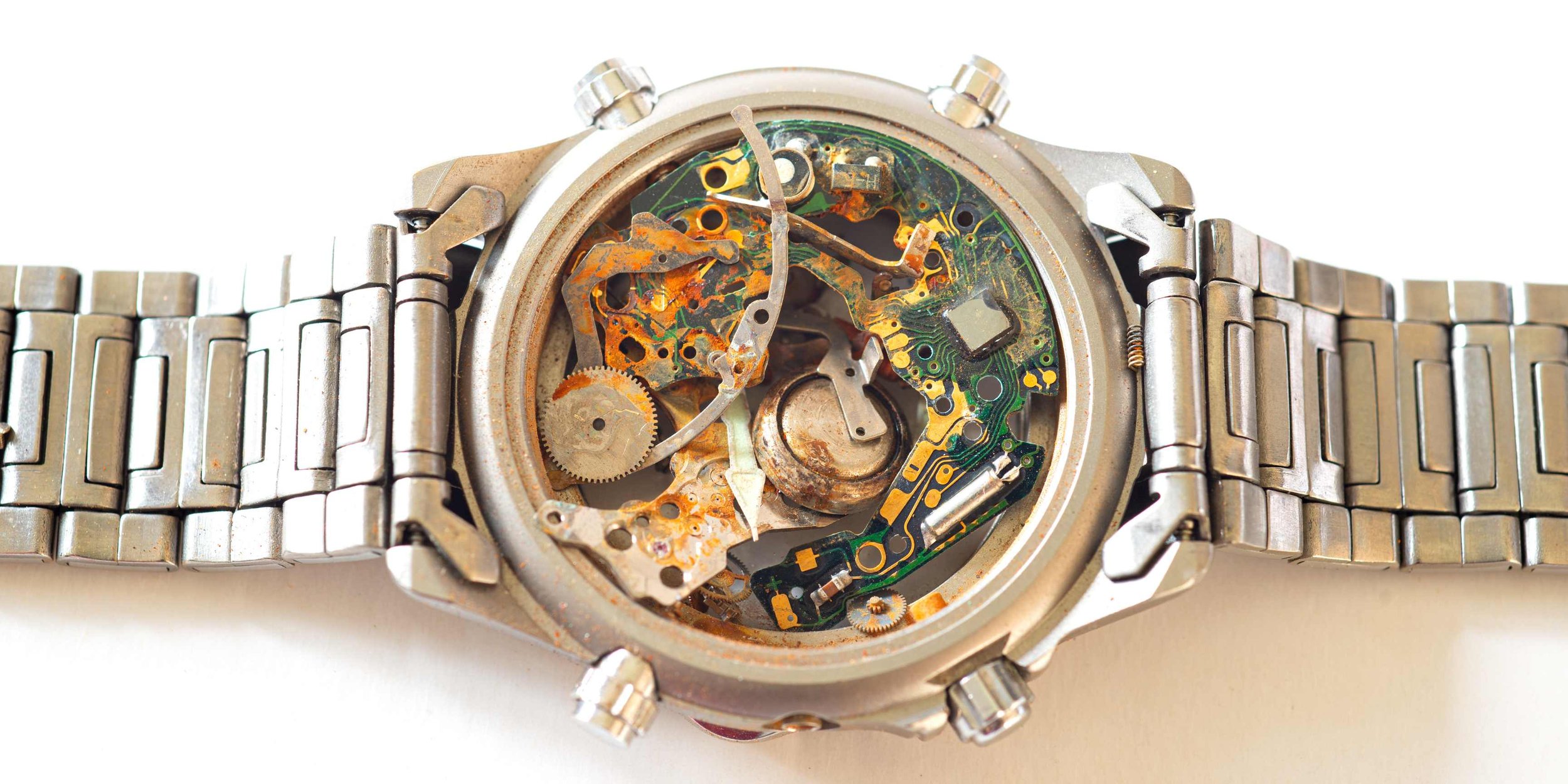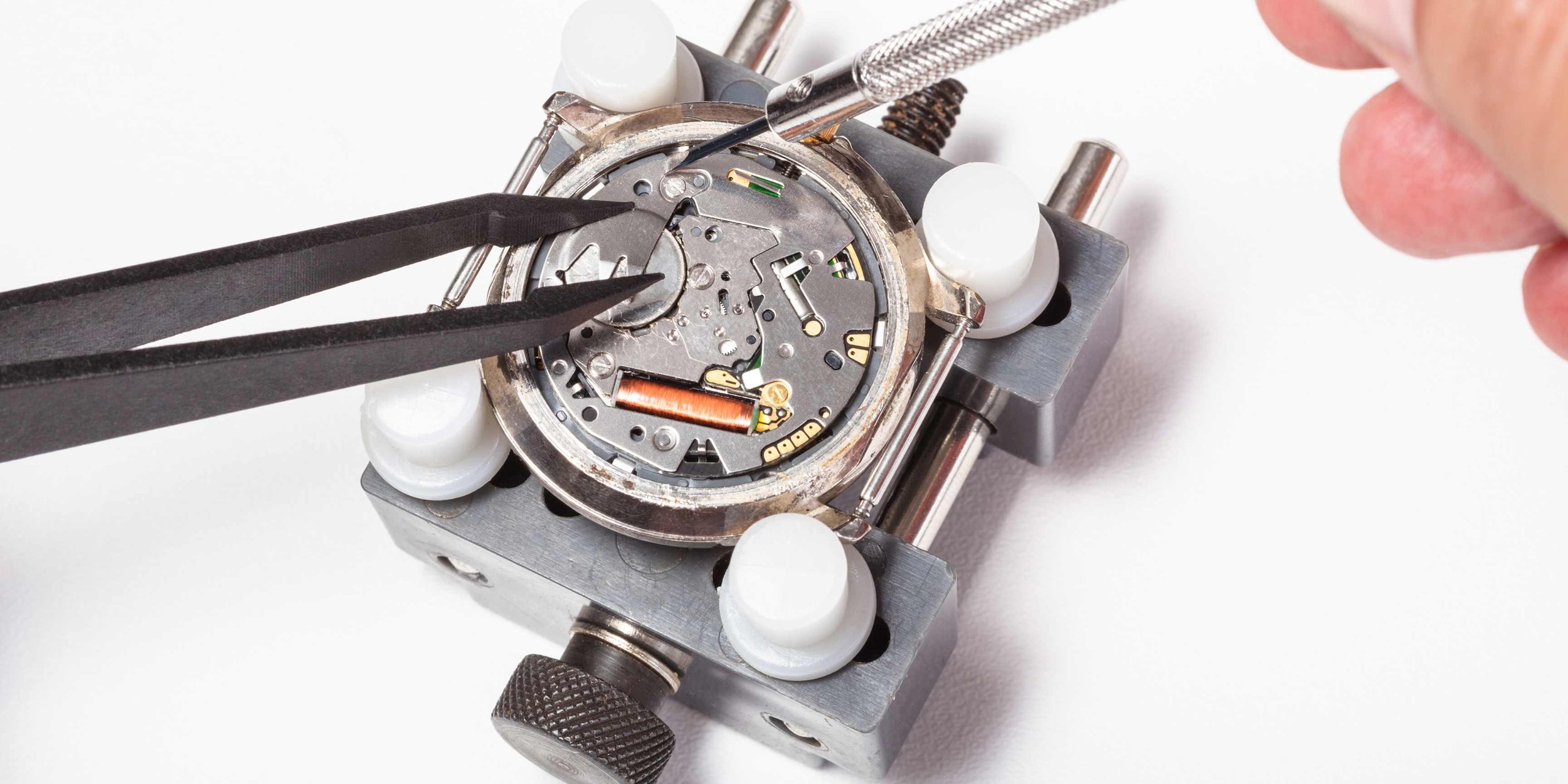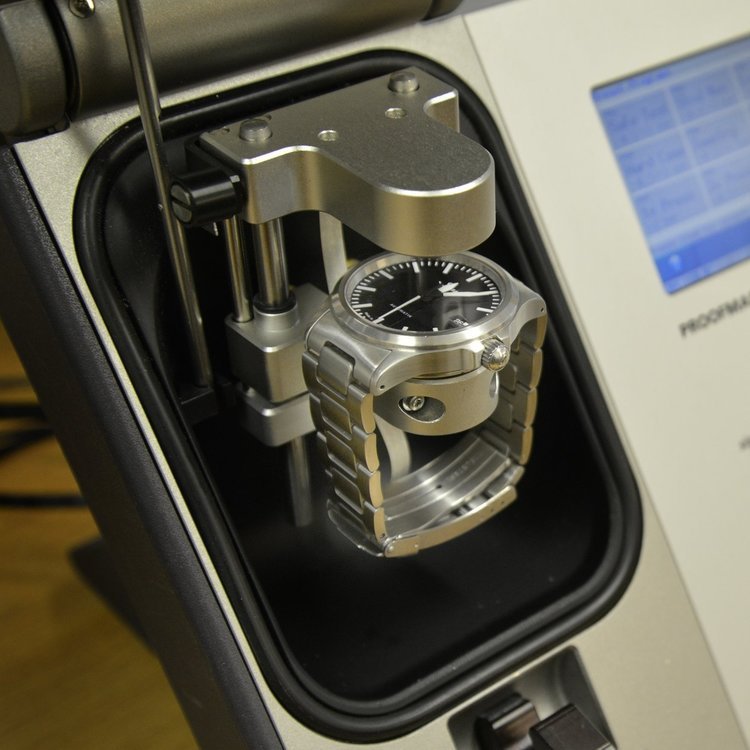How to Care for Your Quartz Watch
Last updated May 2025 by Huxley Mann.
Quartz watches are renowned for their accuracy, reliability, and low-maintenance nature. But that doesn’t mean you can neglect them entirely. Whether you own a luxury quartz model from OMEGA or a stylish timepiece from Gucci, proper care is key to preserving your watch’s performance and appearance over time.
In this guide, we’ll explore how quartz watches work, common problems that cause them to stop, essential care tips, and when to seek professional watch servicing or repairs.
What is a quartz watch?
A quartz watch is powered by a small battery (or a solar cell in some models) and uses a tiny piece of quartz crystal to regulate time. The crystal oscillates at a consistent frequency—32,768 times per second—providing remarkably accurate timekeeping.
Because quartz watches have fewer moving parts than mechanical watches, they’re generally more reliable and less expensive to maintain.
Which Is Better Mechanical or Quartz Watch?
Quartz watches are known for their accuracy and low upkeep, while mechanical watches shine in craftsmanship and tradition. The best choice depends on your lifestyle and personal taste—this side-by-side comparison will help you weigh the pros and cons to decide which watch best suits you.
| Feature | Quartz Watch | Mechanical Watch |
|---|---|---|
| How It Works | Powered by a battery or solar cell. Timekeeping is regulated by a vibrating quartz crystal. | Powered by a mainspring that must be manually wound or self-wound via movement (automatic). Timekeeping is regulated by a balance wheel. |
| Accuracy | Extremely accurate – usually gains/loses only a few seconds per month. | Less accurate – typically gains/loses a few seconds per day. |
| Maintenance | Low maintenance. Battery replacement every 3–5 years. | Requires regular servicing (every 1–3 years) to clean, oil, and calibrate the movement. |
| Durability | Fewer moving parts, more shock-resistant, better for everyday wear. | More delicate due to complex mechanisms. Prone to wear if not serviced. |
| Lifespan | A quartz watch can last decades if it is well-maintained. Movement replacement is often affordable. | Can last for generations with proper care. Mechanical movements are often repairable. |
| Cost | Typically more affordable – great for budget-friendly, high-accuracy options. | Generally, more expensive due to craftsmanship and complexity. |
| Craftsmanship | Focuses on precision and reliability, often mass-produced. | Highly valued for intricate design and traditional craftsmanship. |
| Power Source | Battery or solar. No winding required. | Manual winding (hand-wound) or automatic (motion-activated). |
| Environmental Impact | Battery disposal is required. Solar quartz options are more eco-friendly. | No batteries – purely mechanical energy, more sustainable long-term. |
| Ideal For | Daily use, professionals, minimal upkeep. | Collectors, enthusiasts, those who appreciate horological art |
Final Verdict
If you value accuracy, convenience, and affordability, a quartz watch is ideal. If you’re drawn to tradition, craftsmanship, and mechanical beauty, consider a mechanical watch.
Why Would a Quartz Watch Stop Working?
In most cases (around 90%), a quartz watch stops working because it needs a simple battery replacement. However, other common causes could include:
Dirt has become embedded within the movement
Oxidation or corrosion has formed around the battery
The watch's movement has been exposed to water
Watch hands have become misaligned
Damaged watch coil
Faulty circuit board
Your watch has become magnetised.
Battery failure
Regardless of the cause, if your watch isn't working, it's best to have it checked over by a professional watchmaker. Addressing any issues early can prevent further damage and avoid unnecessary additional costs later on.
Example of a Quartz watch's movement that has succumbed to water damage.
Are Quartz Watches Worth Repairing?
Absolutely—quartz watches are well worth repairing, especially when they’re high-quality or carry sentimental value. Luxury quartz watches like the Omega De Ville, TAG Heuer Aquaracer, and Cartier Tank Must are renowned for their precision, craftsmanship, and timeless design. Investing in repairs not only keeps these wristwatches running smoothly but also helps preserve their performance, appearance, and long-term value, making it a wise choice for any watch enthusiast.
Can a Quartz Movement Be Replaced?
Yes, quartz movements can be replaced! If your quartz watch is having issues beyond just a battery replacement, like a faulty circuit board, replacing the entire movement can be more cost-effective and reliable in the long run than repairing the individual components, such as the circuit board, which can be unnecessarily time-consuming.
How to Look After Your Quartz Watch: Maintenance Tips for Longevity
Taking care of your quartz watch ensures it stays accurate and reliable for years to come. Below, our watchmakers have shared their top tips to help you maintain your timepiece and avoid costly repairs.
🔋 1. Replace Old Watch Batteries Promptly
A quartz watch battery typically lasts between 1 and 3 years, depending on the type of movement, watch functions, battery quality and usage patterns. Leaving a dead battery inside your watch can lead to leakage and corrosion, which may damage the movement beyond repair. A simple fix might turn into a costly repair, or even require complete movement replacement.
💡 More Watch Care Tips: Learn the key signs that it’s time to replace your watch battery.
🧲 2. Be Aware of Watch Magnetism
Magnets are everywhere—inside smartphones, headphones, laptops, kitchen appliances, and even jewellery clasps. While harmless in many cases, they can quietly interfere with the performance of your quartz watch.
Quartz movements contain metallic components, such as stepper motors and circuits, that can become magnetised, which may cause:
Your watch runs too fast or too slow
Hands to jump, stutter, or stop altogether
Interference with the motor that moves the hands
Even brief exposure to a strong magnetic field can affect your quartz watch's accuracy. That’s why it’s essential to be mindful of magnets and know how to protect your watch from magnetic interference.
💡 Watch Care Tip: How to identify if your quartz watch has become magnetised.
🌡️ 3. Avoid Sudden Temperature Changes
Temperature fluctuations can have a noticeable impact on your quartz watch’s performance and longevity. Here’s how:
Battery performance: Extreme temperatures—whether hot or cold—can affect your watch's battery. Heat can cause the battery to drain faster, while cold can reduce its efficiency, shortening its lifespan over time.
Quartz crystal accuracy: Your quartz watch’s crystal works by vibrating at a precise frequency. When temperatures fluctuate, it can throw off the crystal’s vibration, leading to inaccurate timekeeping.
Lubricant degradation: The lubricants inside your watch’s movement can thicken in the cold and thin in the heat. This change in viscosity increases friction, which can negatively affect your watch's precision.
Expansion and contraction: Rapid shifts in temperature can cause the internal components of your watch to expand or contract, which can impact the movement and even affect your watch’s water resistance, compromising seals and gaskets.
💡 Watch Care Tip: How to Avoid Sudden Temperature Changes for Your Watch:
Avoid Extreme Environments: Keep your watch away from places with dramatic temperature fluctuations, such as a car dashboard, near heaters, windows, or in humid areas like bathrooms.
Store Your Watch Properly: When you’re not wearing your watch, store it in a place where the temperature is stable.
Be Mindful of Outdoor Activities: If you're heading outdoors, especially in extreme weather, it’s a good idea to take off your watch.
💧 4. Have Your Quartz Watch Pressure Tested
If your quartz watch is water-resistant and you're planning to take a dip in the ocean during your holiday, or if you're an avid swimmer, it's a good idea to have your watch pressure-tested regularly.
Having your watch pressure tested ensures that its seals, gaskets, and case are intact and functioning as they should. Over time, these components can degrade, leading to a decrease in water resistance. A pressure test will identify any potential issues that could result in any water or moisture infiltrating your watch's internal components, which can (and will) wreak havoc.
💡 More Watch Care Tips: How to spot the early signs of water damage in your watch.
🧽 5. Clean Your Quartz Watch Gently
If you have a stainless steel quartz watch, you can easily give your wristwatch a gentle clean at home:
Use lukewarm, soapy water and a soft microfiber cloth to wipe away dirt and grime from the watch's surface.
Rinse with clean water to remove any soap residue.
Dry with a clean, soft microfiber cloth to avoid water spots or streaks.
Additional Tips:
Remove leather straps before cleaning.
Avoid harsh chemicals like ammonia or bleach, as they can damage the watch’s finish and seals.
Never use abrasive materials (like rough sponges or paper towels), as they can scratch the surface.
For stubborn stains or marks, consider having your watch professionally polished.
🔧 6. How Often Should You Service a Quartz Watch?
At AMJ Watch Repair, we recommend having your quartz watch professionally serviced every 3–5 years. Even though quartz watches require less upkeep than their mechanical counterparts, regular servicing helps maintain peak condition, reduces the risk of costly repairs, and extends the overall lifespan of your timepiece.
Signs your quartz watch may need servicing:
Is your watch running too fast or too slow?
The second-hand skips several seconds
Condensation under the watch glass
You can hear a rattling noise in the case
The hands or dial seem loose
Odour coming from your watch
If you notice any of these issues, it's best to take your wristwatch to a qualified repair shop to prevent further damage.
💡 More Watch Care Guides: The processes behind having your watch serviced.
Keep Your Quartz Watch Running Smoothly
Taking care of your quartz watch is the best way to keep it ticking perfectly for years. Simple things like replacing the battery on time, keeping it away from magnets and extreme temperatures, getting it pressure tested regularly, and cleaning it gently can make all the difference. These small steps can help you avoid expensive repairs and ensure your watch stays in great shape!
💬 Have any questions about your quartz watch? Feel free to drop them in the comments below or reach out directly to us. We’re happy to provide expert advice and guide you through any concerns you may have.




